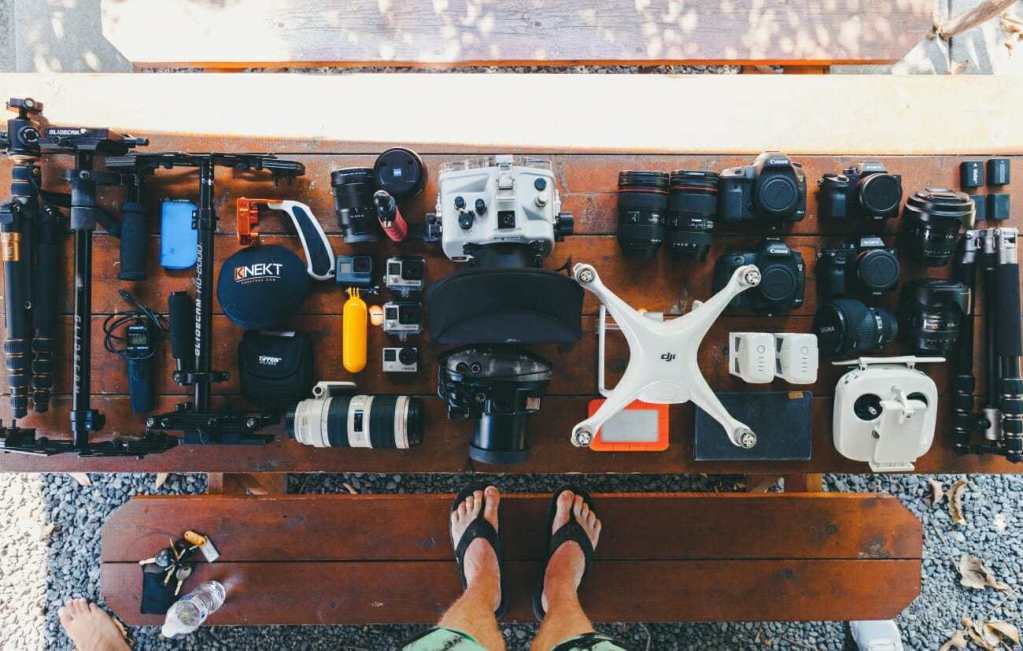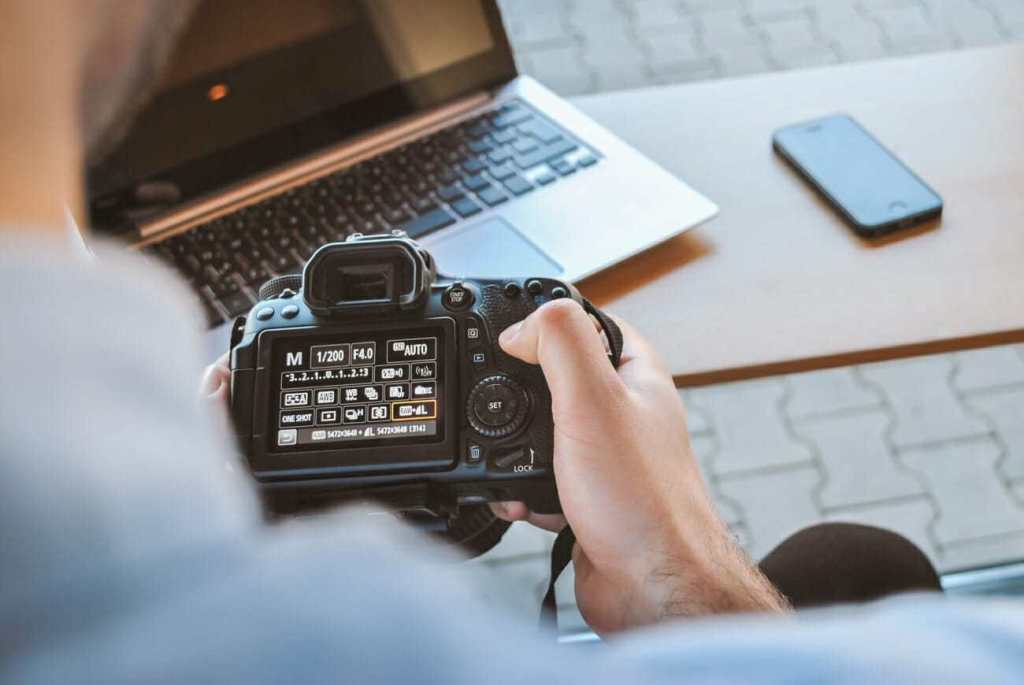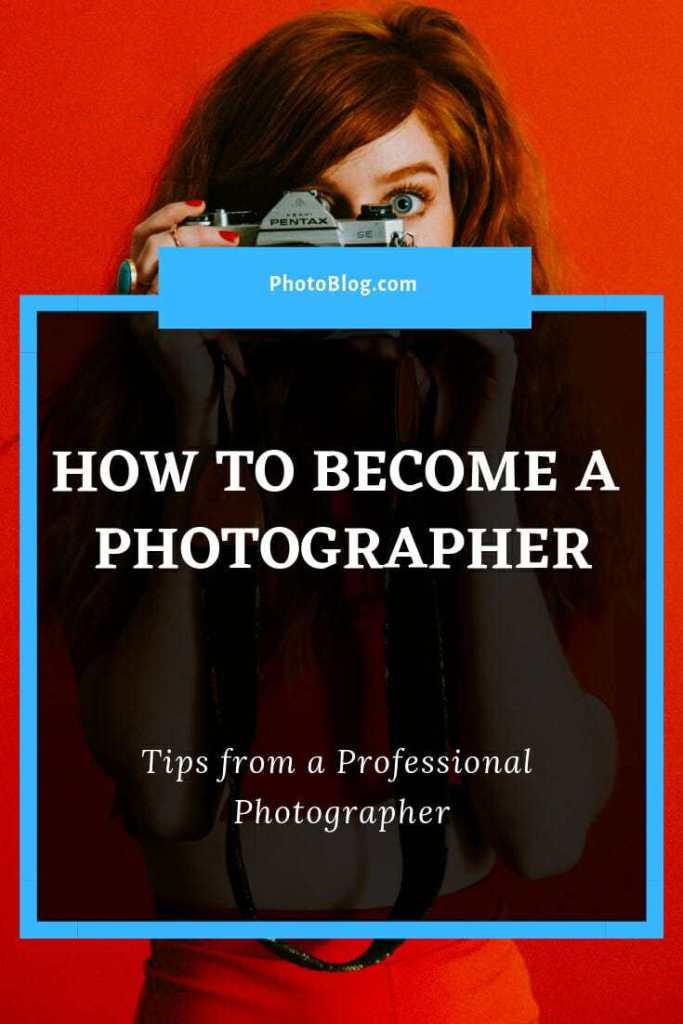Do you want to become a professional photographer?
One that’s truly successful?
In this guide, I’ll share tips, tricks, and secrets for how to become a
…which will ensure that you move in the right direction–and become the professional photography that you’ve always wanted to be.
Let’s get started.

How to Become a Photographer
Now that you have a sense of whether you should get a formal degree in photography…
…let me share some specific tips for becoming a successful professional photographer.
Starting with:

1. Practice Photography Constantly to Develop Your Skills
If you want to be a professional photographer, what’s the best thing you can do right now?
Begin taking as many photos as possible.
Don’t overthink it. Just start taking photos of anything that interests you! In order to master your camera and hone your skills, you must take this first step.
During the early days, don’t worry about whether the photos are technically correct; that will come with time! Instead, get into the rhythm of just shooting anything that catches your eye.
This will help you recognize the type of photography interests you–while also training your eye to be on the lookout for potential photo subjects.
It’s also helpful to get yourself into the habit of shooting often.
You’ll be doing more and more of this as your business grows.
2. Start Shooting as a Photographer in Public
Once you’ve figured out your favorite areas of photography…
…it’s a good idea to get out and begin taking photos in your community.
For example, if you’re interested in photojournalism, then attend public events and capture the mood. If you’re interested in fashion photography, find a few friends willing to model and practice at a local spot.
If you’re interested in astrophotography, track the lunar cycles or weather and get out there!
Most cities have local groups that get together for all sorts of activities, so checking out local possibilities on sites like Meetup.com can be helpful if you want company.
Better yet, if you have friends with similar interests, organize a group outing!
This can also help establish you as a leader in that niche of photography. It’s never too early to start building your own authority!
3. Work With the Gear You Already Have
If you look at the cameras on the market today, it’s easy to get caught up in the technical specifications. You may feel like you have to spend thousands of dollars.
But in reality?
This is completely unnecessary. One big thing to keep in mind is that the gear does not create the photos. You do.
A top-of-the-line camera can take amazing photos–but only when it’s in the hands of someone who has

Likewise, a basic entry-level camera can still create beautiful works of art–if it’s in the hands of someone with imagination.
If you have a camera right now, begin with that! Avoid comparing your camera or lenses to that of seasoned professionals. You can rest assured that they started out with very modest gear themselves.
In fact, I recommend you master your current camera before you even think about upgrading.
Why?

Only once you’re familiar with basic camera settings, your preferred niche, and your style of shooting will you be better informed about which camera is the best fit for you and why.
For example, you may love shooting interiors, but the camera you’re eyeing in the store may not be able to mount the lenses that are used for architecture. Or you’re interested in photographing events, but you don’t realize that you need a camera that works well in low light and has built-in stabilization.
Bottom line?
It’s wise to begin with what you have–until your experience and expertise force you to upgrade your camera or lens.
There will be plenty of big expenses in your photography career. So make sure that you’re spending money wisely.
4. Master the Photography Basics for the Best Foundation
It’s important to get into the rhythm of shooting a lot and learning about your camera.
But you’ll also want to make sure to master the basics.
Why?
A strong grasp of photography basics is necessary for working your way up to professional techniques.
Now, photography basics essentially come down to the exposure triangle: shutter speed, ISO, and aperture. Understanding how these three settings work together to create an exposure will allow you to get creative in the future.
While you’re learning the basics of photography, don’t forget to learn the ins and outs of your camera’s features. Read through the camera manual to get an idea of features that are at your disposal. You never know when they’ll come in handy to capture a moment!
Consider carrying the manual with you in your camera bag, or save a digital version of the manual on your phone so that you always have access to the information.
While you’re getting to know your camera, having the manual handy also helps if there’s any technical issue while out shooting. Often there’s a simple solution for any technical glitch, and a glance into your manual could save you lots of time.
5. Never Stop Learning, No Matter Your Skill Level
We already talked about education, but it doesn’t stop once you have a degree.
A thriving professional photographer is always learning. Whether it’s about editing techniques, studio shooting tips, how to work with clients, marketing, or branding, there are always things to discover.

Yes, you understand your camera’s features and have a firm grasp of the exposure triangle, but that’s just the beginning. Make it a point to do at least one educational project a year.
This could be in the form of an online course, as a job assisting a seasoned pro, or as a one-day workshop about marketing your business. Even as you become
6. Share Your Work Constantly to Attract Interest
If you’re hoping to make photography your career, then you’ll need clients.
But people can’t hire you if they don’t know you’re a photographer!
So before you begin charging anyone for your services, start getting the word out. Share your photos on social media. Don’t worry about whether people respond to your posts or not.
When chatting with people, mention that you’re doing photography and loving it! Chances are that person will ask you more about what you shoot and what your plans are.
Don’t consider this a form of marketing or selling. Instead, use it as an opportunity to just tell someone about something that excites you! If you consistently share this part of your life with people, eventually you’ll be their friend, “the photographer.”
And when the time comes?
They’ll go to you for photos.
7. Create a Well-Designed Website
You’re sharing photos on social media.
But at some point?
You’ll need a website.
It doesn’t have to be amazing or perfect to start, but it needs to look professional.
Thankfully, you can design a nice website for minimal financial investment!

Platforms like WordPress (check out these stunning WordPress photography themes) and Squarespace offer a great way to create a professional website. Sites like Wix and Zenfolio provide less expensive options.
As soon as you’re able, you should invest in a site with the following characteristics:
- A custom domain. Avoid having something like “www.yourname.wix.com.” This just distracts from your brand and diminishes your image as a professional.
- Clean, modern site templates that focus on your photos. These need to include large gallery images. Keep in mind that your site should be more about the photos than about any written descriptions.
- Easy to navigate. You don’t want people going to your site and getting confused.
- Easy to update. Unless you’re ready to hire someone to manage your site and do all updates, be sure that you understand how to update galleries, written sections, or add/delete pages.
- Makes it easy for people to connect with you. This may be as simple as showing your social media icons or may include a contact form that is integrated into a page. Don’t make it difficult for people to hire you.
- Avoid showing the site provider’s logo. Sites like Wix or Zenfolio often have their logo automatically appear on the footer of their sites. Often, free sites don’t allow you to remove it, but paid sites do. You don’t want anyone’s logo but your own to appear on your website.
8. Focus In On Your Niche
It’s great to be showing your work.
But once you choose a niche to specialize in, you’ll want to start displaying only that type of work.
If you choose to specialize in product photography, then you’ll want to phase out family portraits.
Here’s
You want to show people that you’re a photographer for specific needs.
If you want to show only product photos but find yourself still needing to photograph a lot of families to make ends meet, then consider going out and finding opportunities for product photography!
You may hand-pick several businesses to offer free product shoots to, or you may take some quality products from your own home and do a full photoshoot with those products.
However you need to do it, begin showing the type of work that you want to be hired for.
9. Make Your Business Official
Before you start actually charging, you should make your business official.
Often, there’s a period of time where you’re testing the waters to see if you really want to stick with photography long-term. A photography business can take a long time to become profitable, so it requires a lot of commitment and determination!
Once your mind is made up, though, it needs to be made official. This means registering for a business license and setting aside a percentage of your earnings for taxes.
Open a separate business bank account so your expenses are separated and easier to calculate for tax season.

Take this time to create basic contracts and invoices that you’ll present to clients. They don’t need to be anything
- What happens if someone arrives late
- What happens if the shoot gets delayed by the client or the weather
- When payments are due
- Who retains copyright
- What sort of usage rights you grant to the client
- What sort of photo editing is included
- When the contract becomes applicable
10. Make a Plan for Business Growth
Now that you’re familiar with your gear, learning loads of new techniques, have narrowed down your niche, and officially have a business…
It’s time to make a plan.
You don’t necessarily need a traditional business plan, but you should sit down to consider things like:
- Target market. Who is your ideal client? What are you providing
to them? - Services offered. What type of photography services do you offer? Do you also do video? How about products such as prints or albums?
- Rate structure. This is a great time to consider rates. Research your local market to find a rate range that works for your level of expertise in your part of the world.
- Marketing venues (and budget, if any). Where are you going to be marketing your business? Social media? Print ads? Word of mouth? In-person networking? What sort of budget do you have for these marketing tactics?
- Client process. Create a basic process that your clients will go through. Begin when they first inquire about your services and walk all the way through to photo file delivery.
- Contracts, invoices, and releases. This is also not normally part of a business plan either, but this is a great time to finalize a contract, an invoice template, and your model/property releases.
- What’s your vision? Here’s where you can dream. What do you see for yourself in one year? How about in five years? How about in ten years?

Keep in mind that all this can change as your business grows and evolves.
In fact, this business plan should be revisited at least once a year–so that you can update it to fit your current business goals, and so it can reflect any changes needed as you gain expertise.
Thinking through your goals and branding in the beginning, though, will give you clarity on how to move forward. It’s easy to lose track of these goals, so writing them down on paper and displaying the list somewhere in full view will help you stay focused.
11. Connect With Other Pros for Numerous Benefits
What’s one of the most important tools you’ll develop in your career?
Your network.
If you go through a formal program for a degree, this network may start with your fellow students.
If you dive into the business and learn as you go, your network will begin with your friends.

Beyond this, connecting with fellow photographers, whether socially or in a formal setting, will be incredibly helpful.
Knowing other professional photographers can offer many benefits, including:
- Mutual learning. They learn from your experiences and you learn from theirs.
- Collaborations leading to new types of work or unexpected business growth.
- Having others in the same industry to talk with will help during difficult times.
- Client referrals often come from other photographers who either don’t work in the same niche or are overloaded with work.
- Instant brainstorming partners. Who better to talk business with than someone who just gets it? A fellow photographer is perfect for brainstorming sessions and bouncing around ideas for growth.
- It gets you out of the house. It’s very easy to spend hours upon hours in front of a computer without another person nearby. Having a network to support you and get you out of the house every once in a while will help balance that out.
Do You Need a Photography Degree?
Before I get into the details of how to become a photographer…
…let me answer this common question:
Do you need a degree to become a photographer?
The short answer is no.
Technically, a degree isn’t required to be a successful professional photographer.
However, some paths will lead you to seek out a degree in photography. In fact, there are several routes that you can take in order to become a skilled photographer:
- Formal degree from an accredited institution
- Self-taught path where you learn as you build your business
- Online education programs or courses
Specializations like photojournalism or any scientific photography may require a certification–or rely on an educational foundation.
Organizations like the PPA (Professional Photographers of America) offer their own certification–which classifies you as an official professional photographer. That way, your clients can be sure you’ve reached a certain level of skill.

If you’re considering a niche field, a quick online search will give you ideas about possible requirements.
Keep an eye out for specialized organizations that grant certificates. And look for job listings that list requirements for employment.
Reasons to Get a Photography Degree:
If you’re able to connect with a professional in that niche, even better! They’re often able to offer priceless advice that caters specifically to that job.
- It will provide direct access to resources as you learn the fundamentals of your gear and processing.
- Provide countless opportunities to exercise your artistic eye and prepare it for working with paying clients.
- It gives you personal contacts in the field, many of who will most likely be helpful as you seek out your first clients and collaborators. Essentially, it gives you a professional network! This alone can be career-changing.
Reasons to Skip a Photography Degree:
- It’s often not required for success.
- Learning through experience is often far more beneficial than learning in a closed environment. While you can learn about marketing, camera settings, and photo editing in a classroom, there’s nothing quite like real life experience when learning new things.
- A degree is costly and time-consuming.
- You don’t have to give up on formal education altogether. In-person workshops, community college courses, and online courses are all options that are available to you as you build your business. Foregoing the formal degree programs also gives you the flexibility to choose specific courses that fit your needs at that moment. For example, you may be struggling with your Photoshop skills, and so you can take a one-day workshop on Photoshop editing.
Online Photography Courses May Be the Answer
- Online education options are growing rapidly, and offer a formal education with the flexibility to work at your own pace.
- Sites like Creative Live, Udemy, and FStoppers have course
catalogs with a wide array of options that provide a classroom education available on your computer. - Since this form of education is self-paced, it’s also given at a much lower cost. Many courses, especially at the beginner level, can be found for $10-$50 per course.
How to Become a Photographer: Conclusion
Now you know how you can become a successful photographer!
But it’s important to remember that the learning never stops.
And the community you create for yourself is invaluable.
With a curious mind and resources to turn to, the possibilities are endless!

Download FREE Photography Lighting Cheat Sheet
Subscribe and get a free downloadable photography lighting cheat sheet
